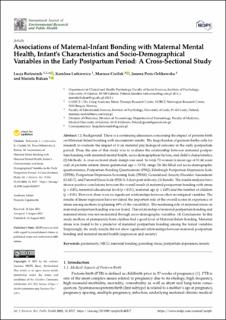| dc.description.abstract | (1) Background: There is a continuing discussion concerning the impact of preterm birth on Maternal-Infant bonding with inconsistent results. The large burden of preterm births calls for research to evaluate the impact of it on material psychological outcome in the early postpartum period. Thus, the aim of this study was to evaluate the relationship between maternal postpartum bonding with maternal mental health, socio-demographical factors, and child’s characteristics. (2) Methods: A cross-sectional study design was used. In total, 72 women (a mean age of 31.44 years old) of preterm infants (mean gestational age = 33.54; range 24–36) filled out socio-demographic questionnaires, Postpartum Bonding Questionnaire (PBQ), Edinburgh Postpartum Depression Scale (EPDS), Postpartum Depression Screening Scale (PDSS), Generalized Anxiety Disorder Assessment (GAD-7), and Parental Stress Scale (PSS) 1–3 days post-delivery; (3) Results: The results analyses have shown positive correlations between the overall result of maternal postpartum bonding with stress (p < 0.01), maternal educational level (p < 0.01), maternal age (p < 0.05) and the number of children (p < 0.01). However, there were no significant relationships between other investigated variables. The results of linear regression have revelated the important role of the overall scores in experience of stress among mothers (explaining 49% of the variability). The mediating role of maternal stress on maternal postpartum bonding was not found. That relationship of maternal postpartum bonding and maternal stress was not moderated through socio-demographic variables. (4) Conclusions: In this study mothers of prematurely born children had a good level of Maternal-Infant bonding. Maternal stress was found to be a predictor of maternal postpartum bonding among the tested variables. Surprisingly, the study results did not show significant relationships between maternal postpartum bonding and maternal mental health (depression and anxiety). | en_US |

